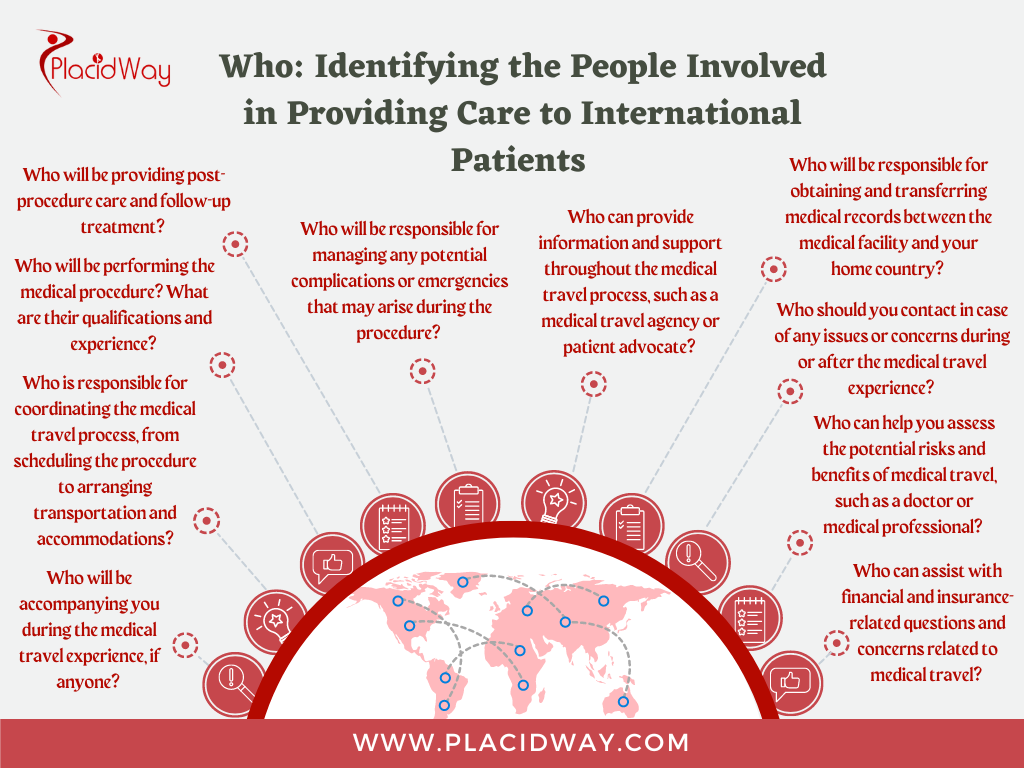Part 2 of Series: Answering the Top 100 Questions of International Patients in Medical Tourism
As we proceed to answer the next set of customer questions, it is essential to recognize the importance of understanding the "WHO" of the medical traveler journey. This knowledge can help clinics better prepare to provide exceptional service to their patients. The process of providing medical care to international patients involves a range of healthcare professionals who collaborate to deliver the best possible care. This ecosystem of people includes healthcare providers such as doctors, support staff at the clinic, logistics coordinators, marketers, customer service personnel, interpreters, and other professionals.

Who will be performing the medical procedure? What are their qualifications and experience?
A key concern for patients is the identity of the medical professionals who will perform their procedure. In the interest of transparency, medical tourism providers should provide detailed information about the qualifications and experience of their medical staff, including surgeons, anesthesiologists, and nurses. Patients should also be informed about the medical staff's credentials and certifications, as well as the medical facility's accreditation and licensing requirements.
Who is responsible for coordinating the medical travel process, from scheduling the procedure to arranging transportation and accommodations?
Organizing medical travel is a complex process that patients often entrust to medical tourism providers. Medical tourism providers should have a dedicated team that specializes in coordinating medical travel. This team should be responsible for scheduling the medical procedure, arranging transportation and accommodations, and offering support with visas and other travel-related documents.
Who will be providing post-procedure care and follow-up treatment?
Post-procedure care and follow-up treatment are critical components of a successful medical travel experience. Patients should be provided with information about the post-procedure care and follow-up treatment options available to them, as well as the qualifications and experience of the medical staff responsible for their care.
Who will be responsible for managing any potential complications or emergencies that may arise during the procedure?
While rare, medical procedures can result in complications and emergencies. Medical tourism providers should have a plan in place to address any potential complications or emergencies, including access to emergency medical care and support from local medical professionals. This plan should be communicated to patients in a clear and transparent manner to ensure their confidence in the process.
Who can provide information and support throughout the medical travel process, such as a medical travel agency or patient advocate?
Patients may have questions or concerns throughout the medical travel process, and it is essential to have access to information and support. Medical tourism providers should have a dedicated team or partner agency responsible for providing patients with information and support, including answering questions, providing updates, and addressing concerns.
Who will be responsible for obtaining and transferring medical records between the medical facility and your home country?
Accurate medical records are crucial for providing continuous medical care. It is essential to ensure that they are correctly transferred between the medical facility and the patient's home country. To achieve this, medical tourism providers should have people responsible for obtaining and transferring medical records. This team should ensure that the patient's healthcare provider has all the necessary information to provide appropriate follow-up care.
Who should you contact in case of any issues or concerns during or after the medical travel experience?
It is crucial to provide patients with contact information for the medical tourism provider or partner agency in case of any issues or concerns during or after the medical travel experience. Having a dedicated point of contact for patients is essential to ensure that their questions and concerns are addressed promptly and effectively.
Who can help you assess the potential risks and benefits of medical travel, such as a doctor or medical professional?
Carefully evaluating the potential risks and benefits of medical travel is a crucial step in the decision-making process. Medical tourism providers should offer patients access to medical professionals who can assist in assessing their individual risks and benefits. This will enable patients to make informed decisions about their medical travel based on their specific medical history and needs.
Who can assist with financial and insurance-related questions and concerns related to medical travel?
Patients who are considering medical travel often have questions and concerns related to finances and insurance. To address these concerns, medical tourism providers should have a person who is knowledgeable about financial and insurance-related questions. This person should be able to assist patients by providing information about payment options and potentially guide them on how to seek insurance reimbursement where possible.
Who will be accompanying you during the medical travel experience, if anyone?
Patients may choose to travel with a companion or family member during their medical travel experience. Medical tourism providers should be prepared to accommodate patients and their companions, including arranging accommodations and transportation. It is also essential to ensure that the companion or family member has access to information and support throughout the medical travel process.
To sum up, recognizing the individuals who play a role in providing care to international patients is critical for a successful medical travel experience. Medical tourism providers should prioritize transparency, assistance with logistics, post-procedure care, emergency management, and dedicated support throughout the process. Addressing patient concerns and providing comprehensive support can establish trust and loyalty with patients, ultimately contributing to the growth of the medical tourism industry.

.png)

